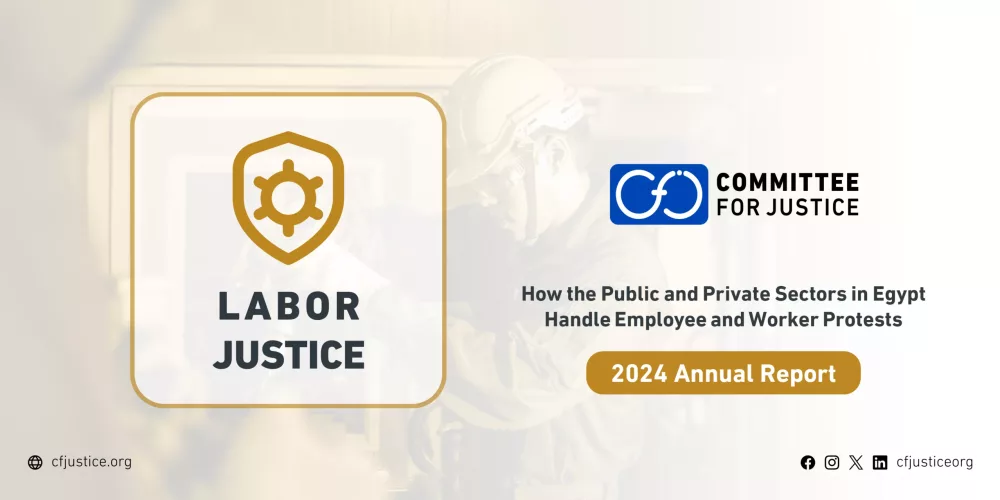The Committee for Justice reported that labor conditions in Egypt significantly deteriorated in 2024 amid a worsening economic crisis that directly impacted workers’ livelihoods and fundamental rights. Instead of seeking genuine solutions to address the economic and social crises, Egyptian authorities tightened their security grip to suppress any growing labor movements, employing repressive tactics and security crackdowns to prevent protests and strikes. This approach was an attempt to contain the mounting labor discontent rather than respond to workers’ legitimate demands for better wages and working conditions.
This report coincides with the committee’s annual release on labor justice in 2024, which examines the status of workers in Egypt, highlighting how both the public and private sectors responded to the rising labor protests triggered by worsening economic challenges. The report details various forms of repression and restrictions faced by workers, including security prosecutions, union restrictions, and arbitrary dismissals, while also shedding light on the difficulties in enforcing court rulings in favor of workers.
Economic Background
The report stated that 2024 saw an unprecedented economic crisis in Egypt, characterized by rising prices for essential services, a worsening foreign currency shortage, and increasing inflation, which directly impacted citizens’ purchasing power. Amid these conditions, workers in both the public and private sectors faced severe living hardships, prompting them to organize protests to demand their rights. However, they encountered harsh repression from both the state and employers.
Public Sector’s Response to Labor Protests
- Security Prosecution and Intimidation: Public sector workers faced a wave of security crackdowns, with many summoned for interrogation due to their participation in protests demanding better wages and working conditions. Notably, workers from Egypt’s Misr Spinning and Weaving Company in Mahalla and Samannoud Textiles Company were subjected to repressive measures, including arrests, enforced disappearances, and arbitrary dismissals.
- Union Restrictions: There were efforts to limit the activities of independent labor unions. Arbitrary decisions targeted union leaders to prevent them from defending workers’ rights. For example, the General Union for Land Transport Workers in Cairo issued an unjustified decision against union leader Mahmoud Abdel Hamid, barring him from union activities and attendance at board meetings for the 2022-2026 term. Additionally, authorities refused to enforce court rulings in favor of dismissed unionists.
- Attempts to Undermine Labor Protests: Some company administrations sought to circumvent strikes and protests by forcing workers to take mandatory leave or threatening them with dismissal, as seen with workers at SEDICO Pharmaceuticals and Delta Sugar Company.
- Arbitrary Dismissals: Many workers faced dismissal after participating in labor protests. Laws such as the drug testing law were used as a pretext to terminate hundreds of employees, including ten workers from the Nile Roads and Bridges Company and five from the Minya Drinking Water Company.
Private Sector’s Response to Labor Protests
- Administrative Investigations and Arbitrary Dismissals: Many private sector companies used dismissals as a means to suppress labor protests. For instance, workers at “Roya” Contracting Company in “Telal Sokhna” and “Katameya” were arbitrarily dismissed. Similarly, Mondelez (Cadbury) in Alexandria forced three employees to resign despite their 15-year tenure and subjected others to administrative investigations for demanding their rights. This also happened with workers at the Turkish garment company “T&C Garment.”
- Refusal to Implement Court Rulings: Despite court rulings in favor of dismissed workers, some companies refused or deliberately delayed their implementation, as seen with arbitrarily dismissed workers from Sigma Pharmaceuticals. This reflects the continued absence of effective mechanisms to protect workers’ rights in the private sector.
- Use of Security Forces to Intimidate Workers: Some private companies resorted to security agencies to suppress labor protests by arresting workers or exerting security pressure to deter them from demanding their rights. An example of this was the repression of workers at “Five Stars Mills.”
Findings and Recommendations
In light of the documented violations, the “Committee for Justice” recommended the following:
- Ending repressive measures against workers and ensuring their right to peacefully express their demands.
- Revising labor market regulations to provide greater worker protection, including amending laws used as a pretext for arbitrary dismissals.
- Empowering independent labor unions and granting them a greater role in defending workers’ rights without interference from the state or employers.
- Ensuring the enforcement of court rulings related to workers’ rights and arbitrary dismissals, with penalties for companies that delay implementation.
- Enhancing social dialogue between workers, employers, and the government to create a more stable and fair working environment.






